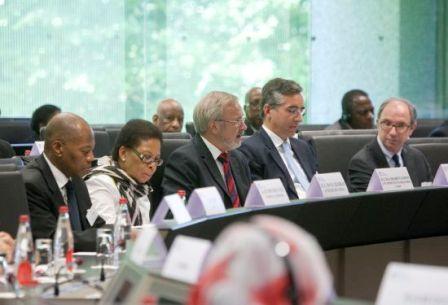Ambassadorial visit to EIB renews focus on SME challenges

Brussels, 1 July 2012/ ACP: Small to medium enterprises (SMEs) in ACP countries still face major barriers in financing, despite their unmistakable role in building local economies, the ACP Committee of Ambassadors heard during the group’s annual visit to the European Investment Bank (EIB) in Luxembourg last week.
Brussels-based delegations from the African, Caribbean and Pacific Group of States spent a day at the EIB headquarters with leaders and experts of the institution, discussing the ACP Investment Facility – a multi-billion Euro programme financed by the European Development Fund and managed by the EIB with the aim of promoting private sector growth and fighting poverty in ACP countries.
Alongside interventions by EIB’s President and Vice President, Head of Corporate Responsibility and Civil Society Mr Hakan Lucius briefed the delegates on some of the challenges faced by small to medium businesses in developing countries. Citing the ‘Dahlberg report’, Mr Lucius said many entrepreneurs find their projects are either too small to be backed by commercial banks and too large for micro-financing. This leaves a “missing middle” for investment needs over US$25,000 but under US$2 million, holding back a large number of ACP businesses.
 Mr Lucius added that International Financial Institutions (IFIs) have a key role to play in aiding SMEs, but need to work through local and international intermediaries to reach these ventures.
Mr Lucius added that International Financial Institutions (IFIs) have a key role to play in aiding SMEs, but need to work through local and international intermediaries to reach these ventures.
Chair of the Committee of Ambassadors H.E Shirley Skerritt Andrew also called for action on the “missing middle” gap. Echoing a newly-adopted ACP Council resolution, she urged EIB officials in their work to address the various issues of SME financing.
“We cannot overemphasise the importance of SMEs to our countries. Indeed SMEs are the very backbone of our economies and the promotion of their development is an imperative for fostering entrepreneurship, competition, innovation, and hence growth of our economies and regions,” she said.
Ambassador Skerritt Andrew highlighted several proposals to enhance access of ACP SMEs to the EIB Investment Facility,such asusing EIB’s partners as an apex to provide loans to other lenders; subcontracting to local and sub-regional levels; using forms of collateral other than government guarantees; and using grant resources to leverage other grants from other institutions for relevant programmes.
Skerrit Andrew alsourged more "blending" in financing, using both development aid andloansto reduce the cost of funds to SMEs, and reiterated the call from ACP ministers to relocate the EIB’s Pacific Office from Australia to one of the ACP’s Pacific Island member countries, for better regional access and ownership.
Some of the measures proposed are already being undertaken by the Bank.
The ACP Secretariathad also carried out a project on 'Enhancing access of SMEs to financing',which resulted inthe adoption of Resolution No. 6at the 95th ACP Council of Ministers Meeting in Vanuatu in mid-June.
EIB lending to ACP countries in 2011 came up to EUR 590.5 million, in addition to EUR 165 million to South Africa. The funds cover a total of 26 projects in 13 countries in five regional groupings, with 30% of lending targeted at SMEs.
Addressby the Chair of the ACP Committee of Ambassadors(PDF)
Address by the ACP Secretary General(PDF)
(Pictured: Top – ACP delegates and EIB representatives at the Bank's headquartersin Luxembourg; Above left – Roundtable speakers, including EIB President W. Hoyer, Vice-President P. Sakellaris, ACP Secretary General Dr Mohamed Ibn chambas and Chair of the ACP Committee of Ambassadors, HE Shorley Skerritt Andrew; Above – Discussion session at the EIB)
– ACP Press
